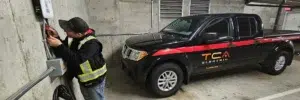Avoid Making These Mistakes When Completing a DIY Project
While we rarely recommend DIY electrical projects, it is true that certain types of electrical projects can be completed by a handy homeowner with the right skills and understanding of electrical systems. It’s fairly common to see DIY installations of lighting fixtures, ceiling fans, and new appliances, to name a handful of possible projects.
Unfortunately, while completing electrical work yourself is sometimes possible, DIY projects are also a common place where we see mistakes made—many of which can lead to dangerous situations. At TCA Electric, our hope is to provide high-quality electrical services while also educating our customers on electrical work and safety. We recommend calling in the professionals for most electrical projects, but if you’re hoping to DIY install lighting fixtures or other basic upgrades, here are the key mistakes to avoid.
Improperly tightened electrical connections
Electrical connections must be secure and fully tightened to ensure proper functionality of electrical components. When connections aren’t made properly, it can result in malfunctioning electrical equipment. For example, with DIY installation of lighting fixtures, this commonly leads to lights flickering or dimming at random, as the poor connection leads to poor flow of electricity to the connected light fixtures.
Poor connections aren’t just inconvenient and annoying, however—they can also be dangerous. Poorly tightened connections can cause overheating, which can damage electrical components and, in some cases, result in an electrical fire.
Not grounding or bonding electrical equipment
Electric shocks are one of the most dangerous aspects of working with electrical components. Shocks can happen for a variety of reasons, but improper grounding and bonding is a common cause, as grounding is one of the primary safety precautions to avoid shocks.
At TCA Electric, we’ve often come across DIY electrical installations where the person completing the installation has not grounded or bonded the equipment. This means that anyone who touches the equipment would get an electric shock if a loose connection were to occur. If you’re installing new electrical components in your home, take extra care to ensure all equipment is effectively grounded.
Leaving components exposed
Electrical work isn’t just about connecting wires so that new lighting, appliances, or devices work when you turn them on. It’s also about ensuring new equipment can be operated safely to protect those who will be using these devices every day.
All too often, a sign of poor (and dangerous) DIY electrical work is exposed electrical components. We often see this in the form of electrical connections made with no electrical box to cover them. If connections come loose, these exposed areas present a huge danger to those around them.
We also frequently see non-electrical equipment installed poorly. For example, an outlet cover that isn’t quite flush with the wall, or a light switch that wiggles when you use it. Not only do these look sloppy, but they also increase the likelihood of electric shocks and other problems.
Overestimating DIY capabilities
If there’s one DIY mistake to rule them all, it’s this: overestimating your DIY capabilities and tackling a project you can’t (safely) complete by yourself. We totally understand the temptation to tackle a tough DIY project. Finishing a project yourself can be highly rewarding, as not only were you able to make improvements to your home, but you were also able to do so at very little cost.
When it comes to electrical projects, however, it’s important to stay well within your abilities and leave the bigger, more complicated projects to the professionals. The above mistakes are just a small handful of the things that can go wrong while DIY installing lighting fixtures, appliances, and other small devices within your home.
As projects get more complex, you’ll start to run into situations you aren’t prepared to deal with, and those who aren’t professional electricians will be less able to improvise effectively. What’s more, the stakes get higher with bigger projects—and tackling a project you aren’t prepared to handle could put both your health and your home at risk.
Don’t DIY! Call TCA Electric for Your Next Project
Here at TCA Electric, we strongly recommend calling a professional electrician for the vast majority of electrical installations and improvements you’d like to make for your home. Electricity is dangerous, and understanding how to safely install a wide variety of electrical devices and components takes years of training and practice.
We have those years of training and practice under our belts already, including a wide range of experience tackling even the most complex electrical projects. Looking to add a new electrical device or appliance, or to make upgrades to your electrical system? Contact TCA today to get started!



